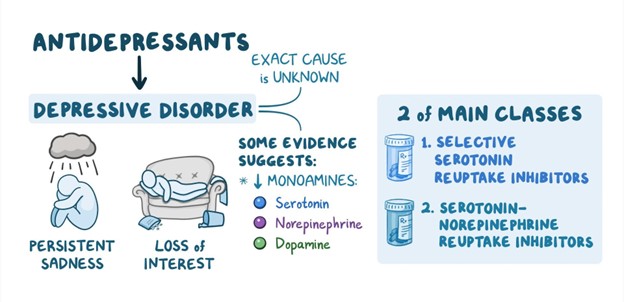A nurse is caring for a client who has major depressive disorder and was prescribed citalopram 2 weeks ago with a planned dosage increase 1 week ago. The client reports having an improved appetite, but still feels very depressed and is still having trouble sleeping. Which of the following actions should the nurse take?
Speak to the provider about adding an MAOI to the current medication regimen.
Explain that antidepressants often take several weeks to be fully effective.
Tell the client that the provider will need to change citalopram to a different medication.
Recommend a sleep study be done on the client
The Correct Answer is B
This action might be premature. MAOIs (Monoamine Oxidase Inhibitors) are a class of antidepressants with specific dietary and medication interactions. They are typically considered when other classes of antidepressants have not been effective. It's important to exhaust other options before considering a switch to MAOIs.
B. Explain that antidepressants often take several weeks to be fully effective:
Explanation: Correct Answer. This is an appropriate response. Antidepressants, including citalopram, can take several weeks to show their full therapeutic effects. It's common for some symptoms to improve before others. Educating the client about the delayed onset of action is important to manage their expectations.
C. Tell the client that the provider will need to change citalopram to a different medication:
Explanation: It might be too early to consider changing the medication after just two weeks, especially since the client reports an improved appetite. Changes in dosage or medication should ideally be discussed with the provider after an adequate trial period.
D. Recommend a sleep study be done on the client:
Explanation: While sleep problems can be associated with depression, it might not be the most appropriate next step based solely on the information provided. It's more important to address the ongoing depressive symptoms before focusing solely on sleep.

Nursing Test Bank
Naxlex Comprehensive Predictor Exams
Related Questions
Correct Answer is D
Explanation
A) Maturational crisis:
This type of crisis arises from normal life transitions, such as entering a new stage of development (adolescence, midlife crisis, etc.). It involves a struggle to adapt to new roles and responsibilities. The client's situation does involve a life transition due to the death of his wife, but the sudden nature of the event and the resulting distress suggest a situational crisis.
B) Adventitious crisis:
Adventitious crises are caused by extraordinary events that are external to the individual's usual experience, such as natural disasters, accidents, or crimes. While the sudden death of the client's wife is an unexpected and tragic event, it's not an adventitious crisis because it involves personal loss rather than a large-scale or external event.
C) Developmental crisis:
Developmental crises are associated with specific stages of life and the challenges and changes that come with them. This crisis doesn't seem to fit the developmental category as it is more tied to the specific event of the wife's sudden death.
D) Situational crisis
Explanation:
A situational crisis is a type of crisis that arises from a specific event or situation that disrupts an individual's normal functioning and coping abilities. In this case, the sudden death of the client's wife is the triggering event that has led to his feeling paralyzed and overwhelmed in his ability to cope with work and family responsibilities. Situational crises are often unexpected and can lead to a temporary state of disorganization and distress.
Correct Answer is C
Explanation
A. "There really isn't much you can do about that until you are discharged." - This response dismisses the client's feelings and does not offer any support.
B. "You should call your boss and ask if you can have your job back." - This response is directive and may not address the client's emotional needs.
C. "You must feel very concerned and disappointed by that information."
This response shows empathy and acknowledges the client's feelings without making judgments or offering solutions. It validates the client's emotions and opens up a supportive space for further discussion.
D. "I don't understand why your partner would upset you with news like that." - This response may be perceived as judgmental and does not show empathy or understanding.
Whether you are a student looking to ace your exams or a practicing nurse seeking to enhance your expertise , our nursing education contents will empower you with the confidence and competence to make a difference in the lives of patients and become a respected leader in the healthcare field.
Visit Naxlex, invest in your future and unlock endless possibilities with our unparalleled nursing education contents today
Report Wrong Answer on the Current Question
Do you disagree with the answer? If yes, what is your expected answer? Explain.
Kindly be descriptive with the issue you are facing.
